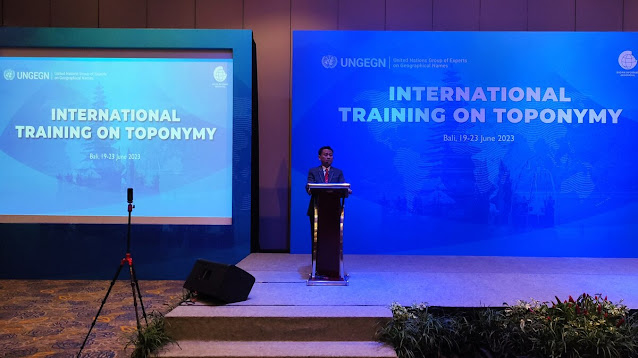Toponymy is the science of naming the earth's features, or place names or locations, taking into account the background, historical connections, cultures, and traditions or customs inherent in a region. The Geospatial Information Agency, along with the Asia South East (ASE) Division and the United Nations Group of Experts on Geographical Names (UNGEGN), collaborated to hold an International Toponymy Training in Kuta, Badung, Bali, starting on Monday (19/6/2023).
International toponymy training was attended by participants from UNGEGN member countries, besides Indonesia. There were 132 participants in the international toponymy training in Kuta, Badung, including from Saudi Arabia, Oman, Jordan, Vietnam, and Laos. During the training, the participants received materials on national institutions, models, and procedures; naming of landforms as cultural heritage; cultural heritage in Bali; and the system for collecting landform names.
The Chairman of UNGEGN Asia South East Division, Nor Zetty Akhtar Haji Abdul Hamid, also expressed her gratitude to the Geospatial Information Agency for organizing the training.
Training ground
Nor Zetty stated that the training activity had been planned since Indonesia's leadership in the UNGEGN ASE Division for the period 2019-2022. However, its implementation was delayed due to the Covid-19 pandemic. "Bali is the right place for the training because participants can directly compare through visits to the location," said Nor Zetty from Brunei Darussalam.
Furthermore, Aris stated that naming a location or geographic feature requires procedures because the naming of a location is also related to formal requirements. Naming a location or place also requires standardization in order to become a standard and not easily changed.
"The local government has the authority to propose the naming of a location because it relates to the value for the region, the cultural roots of the area, and the traditions in the local community," said Aris.



No comments:
Post a Comment